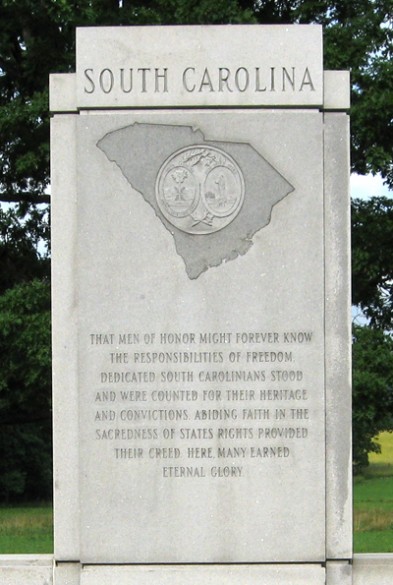
“Seems odd that you would name your ship after a battle you were on the wrong side of.”
“May have been the losing side. Still not convinced it was the wrong one.”
–TV series Firefly, season 1, episode 3
James Leicester was born in Leicestershire, England, in 1714. Upon immigration to America, the last name was shortened to Lester, and the family settled in the area of Virginia to southern Pennsylvania. Charles Lester was born to James and his wife, Catherine Daneford, in 1760, after which the family relocated to Newberry, South Carolina, near the area from which Catherine was originally. Charles fought for the patriots in the American Revolutionary War and fathered seven children, the third of which was Allen Lester, born 1791. Allen’s son, William Lester, was born in 1819. In 1861, the 13th South Carolina regiment was formed in the wake of President Jefferson Davis’s call for volunteers to combat the Northern army’s attack on the Southern Republic. The 13th SC was a volunteer regiment whose members signed up “for the duration.” William Lester helped organize and was elected Captain of Company G of the 13th SC in July 1861, composed of men from Newberry county. The 13th SC was originally assigned to coastal defense but was transferred to the Army of Northern Virginia in time to fight in the battle of Gaines Mill in June 1862, and was present at every major battle of that army until Appomattox in 1865. Captain Lester served with distinction and was promoted to the rank of Lieutenant Colonel in June 1864. Lester was wounded in the leg at the battle of Fredericksburg in December 1862, and he went home to recover from his wounds, thus missing the battles of Chancellorsville and Gettysburg in mid-1863. After recovery, he returned to his regiment and remained there until surrendering and being paroled at Appomattox. The 13th SC did fight at Gettysburg, and William Lester’s son-in-law, Rufus Calvin Boozer, married to Lester’s third and youngest daughter Rhoda, was present as a Private of Company G. The 13th South Carolina fought on the first day of the battle and sustained 130 casualties out of 390 men during the fighting; at least 42 of these were fatalities. Rufus Boozer survived the battle and the war, but a Corporal Burr Boozer from Newberry is listed as one of the 13th’s Gettysburg dead. In 1876, Colonel Lester and a group of his old war comrades joined General Wade Hampton’s Red Shirts in toppling one of the last Reconstruction governments and establishing a white minority government in South Carolina. The corruption, incompetence, systematic tyranny, financial excess, and disregard for the rule of law displayed by the South Carolina Reconstruction government has not been seen again in America until the Obama Administration; here is some recommended reading on the subject. Colonel William Lester passed away in 1886 and was followed soon by Rufus Boozer in 1888.
William Lester was my great-great-great-great-grandfather and Rufus Boozer my great-great-great-grandfather. Today, on the 150th anniversary of the Battle of Gettysburg, I honor their memory and the sacrifice of forty-two of their friends, neighbors, and relatives who didn’t come home from that battle. The fact that Providence did not grant them victory in no way lessens their honor, valor, and sacrifice in rising to oppose a tyrant and attempting to prevent their posterity from enduring the horrors of abortion, sodomite marriage, Obamacare, the Marxist ’60s, amnesty for illegals, Bill-of-Rights desecration, and the myriad other injustices imposed upon us by the modern federal Leviathan.
Deo Vindice
That men of honor might forever know
the responsibilities of freedom.
Dedicated South Carolinians stood
and were counted for their heritage
and convictions. Abiding faith in the
sacredness of States Rights provided
their creed. Here many earned
eternal glory.–South Carolina state monument, Gettysburg, PA
| Tweet |
|
|
|




